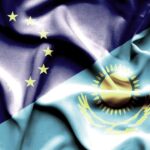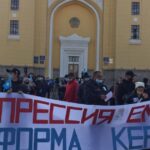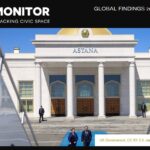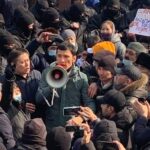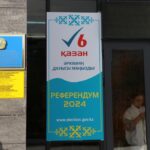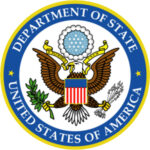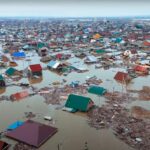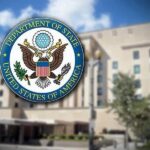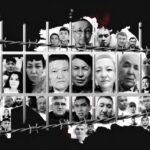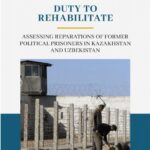November 17, 2010
The constitution provides for freedom of religion, but the government’s religion laws limit the legal protections of religious freedom in the constitution.
There was no change in the status of respect for religious freedom by the government during the reporting period. There was no change in the laws governing religious activity. The government’s enforcement of current laws led to continuing problems for some unregistered groups, as the laws impose mandatory registration requirements on missionaries and religious organizations. While the majority of religious communities worshipped largely without government interference, local officials attempted on occasion to limit some minority groups’ practice of religion. Local and national law enforcement authorities increasingly prosecuted nontraditional religious groups for conducting illegal or unsanctioned educational, religious, or entrepreneurial activities. The government did not overtly criticize “nontraditional religious groups.” However, amid increased government-generated rhetoric on the need to fight “religious extremism,” the number of religious group members accused of terrorism increased.
There were no reports of societal abuses or discrimination based on religious affiliation, belief, or practice. Muslim, Russian Orthodox, Roman Catholic, and Jewish leaders reported high levels of acceptance in society. Some minority religious groups, including evangelical Christians and Scientologists, faced negative media coverage.
The
The country has an area of 1,052,540 square miles and a population of 16.4 million, according to preliminary results of the 2009 national census. Due in part to the country’s nomadic and Soviet past, many residents describe themselves as nonbelievers; surveys from past years suggested low levels of religious conviction and worship attendance. The government maintains statistics on the number of registered congregations and organizations but not on the size of each group. The most recent reliable statistics on religious affiliation are based on the 1999 census.
Although there was a large increase in the number of minority religious congregations registered since 1999, the government believes that percentages of the population belonging to particular religious groups have remained consistent.
Approximately 65 percent of the population professes to be Muslim. Ethnic Kazakhs, who constitute an estimated 60 percent of the population, and ethnic Uzbeks, Uighurs, and Tatars, who collectively make up less than 10 percent, are historically Sunni Muslims of the Hanafi school. Other Islamic groups that account for less than 1 percent of the population include Shafi’i Sunni (traditionally associated with Chechens), Shi’a, Sufi, and Ahmadi. The highest concentration of self-identified practicing Muslims is in the southern region bordering
Approximately one-third of the population, comprising sizeable numbers of ethnic Russians and smaller populations of ethnic Ukrainians and ethnic Belarusians, are Russian Orthodox by tradition. There were 299 registered Russian Orthodox churches. Members of a Roman Catholic archdiocese include ethnic Ukrainians and ethnic Germans and account for 1 percent of the population. An estimated 1.3 percent is ethnic German, many of whom are Roman Catholic or Lutheran. The government reported 83 registered Roman Catholic churches and affiliated organizations throughout the country. A smaller, affiliated community of Greek Catholics, many of whom are ethnic Ukrainians, had five registered churches.
According to government statistics, Protestant Christian congregations outnumber Russian Orthodox or Roman Catholic congregations, although it is unlikely that Protestant Christians account for a larger number of adherents. During the reporting period the government reported 1,267 registered Protestant Christian organizations with 543 places of worship.
There are two Baptist groups in the country: the Union of Evangelical Christians and Baptists (Union of Baptists), with an estimated 10,000 adherents and 227 registered groups, and the Council of Churches of Evangelical Christians and Baptists (Council of Churches) with as many as 1,000 adherents. The Council of Churches refuses to register on principle.
Other Christian religious groups with a sizable number of congregations include Presbyterians, Lutherans, and Pentecostals, as well as Jehovah’s Witnesses and Seventh-day Adventists. Smaller communities of Methodists, Mennonites, and Mormons also are registered.
A Jewish community, estimated at less than 1 percent of the population, has synagogues in Almaty, Astana,
According to government statistics, 43 other registered religious groups during the reporting period, including four registered Buddhist groups, 12 affiliates of the Hare Krishna movement, the
Section II. Status of Government Respect for Religious Freedom
Legal/Policy Framework
The constitution provides for freedom of religion; however, other laws and policies narrow these rights in practice. The constitution defines the country as a secular state and provides the right to decline religious affiliation.
The government’s religion laws narrow the legal protections of religious freedom found in the constitution, and 2005 amendments to the laws reinforce registration requirements. They also clarify that religious groups must register with both the central government and local governments of individual regions (oblasts) in which they have congregations. To register, a religious organization must have at least 10 members and submit an application to the Ministry of Justice (MOJ). Religion legislation continues to provide that all persons are free to practice their religion “alone or together with others.”
The government may deny registration based upon an insufficient number of adherents or inconsistencies between the provisions of a religious organization’s charter and the law. In addition, under the Law on Public Associations, a registered organization, including a religious group, may have all activities suspended by court order for a period of three to six months for defiance of the constitution or laws or for systematic pursuit of activities that contradict the charter and bylaws of the organization as registered. Police, procurators, and citizens may petition a court to suspend the activities of a registered organization for failure to rectify violations or for repeated violations of the law. During a suspension, the organization is prohibited from speaking with the media; holding meetings, gatherings, or services; and undertaking financial transactions other than continued contractual obligations such as paying salaries.
Administrative code article 375 allows authorities to suspend the activities and fine the leaders of unregistered groups; article 374-
The Religious Issues Committee (RIC), which was transferred in March 2010 from the MOJ to the Ministry of Culture, serves as a liaison between religious groups and the government. In addition the RIC consults with the MOJ to facilitate the registration of religious groups. The RIC also provides expert testimony to courts on religious issues, reviews religious materials law enforcement officials obtain in their investigations, and coordinates with law enforcement officials to monitor compliance with registration requirements.
During the reporting period, government officials continued to express concern regarding the potential spread of political and religious extremism in the country. The Committee for National Security (KNB) has characterized the fight against “religious extremism” as a top priority of the internal intelligence service. A 2005 extremism law, which applies to religious groups and other organizations, gives the government broad latitude in identifying and designating a group as an extremist organization, banning a designated group’s activities, and criminalizing membership in a banned organization. The Hizb ut-Tahrir (HT) political movement remained the only group banned under the law. HT is an extremist Islamist political organization motivated by a socioreligious ideology that is virulently anti-Semitic and anti-Western and calls for the overthrow of secular governments. No apolitical religious organizations in the country have been outlawed as extremist.
The government observes Orthodox Christmas and Kurban-Ait as national holidays.
The elections law prohibits political parties based upon ethnicity, gender, or religious affiliation. The criminal code prohibits the incitement of interethnic or interreligious hatred; this law has on one occasion been subject to broad interpretation that included some religious teachings.
The SAMK, headed by the chief mufti in Almaty, exercises significant influence over the practice of Islam, including the construction of mosques and the administration of examinations and background checks for aspiring imams. The SAMK is the primary coordinator of Hajj travel and authorizes travel agencies to provide Hajj travel services to citizens. Religious observers report that the SAMK occasionally pressures nonaligned imams and congregations to join the SAMK to ensure liturgical orthodoxy. Notwithstanding SAMK influence and pressure, there were some registered Muslim communities unaffiliated with the SAMK.
Local and foreign missionaries must register annually with the MOJ and provide information on religious affiliation, territory of missionary work, and time period for conducting that work. All literature and other materials to support missionary work must be provided with the registration application; use of materials not vetted during the registration process is illegal. In addition a missionary must produce registration documents and power of attorney from the sponsoring religious organization to be allowed to work on its behalf. The MOJ may refuse registration to missionaries whose work would be inconsistent with any law, including laws prohibiting the incitement of interethnic or interreligious hatred. Foreign missionaries, like all visitors, are required to register with the migration police and indicate the purpose of their stay. The constitution requires foreign religious associations to conduct their activities, including appointing the heads of religious associations, “in coordination with appropriate state institutions.” Foreigners may register religious organizations; however, the government requires that the majority of the 10 founders be local citizens.
Beginning March 1 the Ministry of Foreign Affairs and the Ministry of the Interior introduced new visa regulations which require a foreigner who works for religious organizations to obtain a missionary visa. Missionary visas only permit a person to stay in the country for a maximum of six months per 12-month period. The new procedures require the RIC to vet applicants, and their visa applications must be accompanied by an RIC-issued letter of approval. Missionary visa applicants must obtain RIC clearance every time they apply for visas.
The government does not permit religious instruction in public schools. Homeschooling is permitted only in certain circumstances, which do not include religiously based motivations. Parents may enroll children in supplemental religious education classes provided by registered religious organizations.
Under the national religion law, religious training of a child should not cause damage to a child’s all-around development, physical, or moral health. The laws do not clarify how such damage should be assessed or which agency would make such a determination. Educational licensing regulations do not permit religious groups to educate children without approval from the Ministry of Education. In accordance with the regulations, a religious organization whose charter includes provisions for religious education may be denied registration if it does not obtain approval from the Ministry of Education.
The government exempts registered religious organizations from taxes on church collections and income from certain religious activities. Congregations are required to pay for services such as fire company protection for religious buildings. The government has donated buildings and land and provided other assistance for the construction of new mosques, synagogues, and Russian Orthodox churches.
Procurators have the right to inspect annually all organizations registered with state bodies, and they regularly conducted such inspections.
On November 26, 2008, parliament passed amendments to the religion law that civil society activists and religious groups widely opposed as severe restrictions of religious freedom. The proposed legislation was sent for signature to the president, who first submitted it to the Constitutional Council for review. On February 11, 2009, the council struck down the legislation, ruling on technical grounds that the amendments were unconstitutional.
The 2007-09 Program for Ensuring Religious Freedom and Improvement of Relations between the Government and Religions, approved by the government in 2007, provides a set of guidelines and plans for the government’s activities in the sphere of religion. Among other things, the program outlines plans for “increasing the stability of the religious situation” and preventing religious extremism through a variety of educational efforts and government-sponsored articles and programs in media outlets. In addition the program criticizes increasingly active “nontraditional religious groups” for causing tension in interfaith relations and ignoring existing social, cultural, and religious traditions. The program calls for new legislation to increase control over missionaries and over the dissemination of religious materials.
The National Action Plan on Human Rights for 2009-12, signed by the president in June 2009, noted several gaps, in particular penalties, between Kazakhstani legislation and international standards on religious freedom and for unregistered religious activities. It also proposed that by 2011 the country should amend its religious legislation to bring it in line with international standards. In addition, the report recommended that the MOJ, in collaboration with nongovernmental organizations (NGOs), begin to publish an annual report on religious freedom. As of June 30, the report has not been published.
The government continued to express publicly its support for religious tolerance and diversity.
Restrictions on Religious Freedom
The government generally enforced existing legal restrictions on religious freedom. However, no apolitical religious groups were banned.
The Hizb ut-Tahrir (HT) Islamist political movement remained banned under the extremism law. Because HT is primarily a political organization, albeit motivated by religious ideology, and because it does not condemn terrorist acts by other groups, authorities’ actions to restrict HT and prosecute its members are not a restriction on religious freedom per se.
Most religious communities choose to register with the government and are ultimately successful in obtaining registration; however, minority religious groups sometimes reported long delays. When it refused or significantly delayed registration, the government usually claimed a group’s charter did not meet the requirements of the law or cited the need to refer it for expert theological review.
The majority of religious groups worshiped largely without government interference; however, local and regional officials attempted on occasion to limit or control several groups’ practice of religion, especially minority religious communities such as evangelical Christians, Jehovah’s Witnesses, Scientologists, and Muslims not affiliated with the SAMK. The government applied laws governing unregistered religious groups unevenly during the reporting period.
During the reporting period, the Baptist Council of Churches noted several court cases against churchgoers throughout the country for participating in the activities of an unregistered group. The council of churches has a policy not to seek or accept registration in former Soviet countries, and church members criticized the intrusive nature of the registration process that requires information about ethnicity, family status, religious education, employment, and political affiliation.
The council reported several instances in which pastors were fined for unregistered religious activities and were subsequently arrested for failure to pay the fines. In all the cases, the terms of confinement were either suspended or limited to three days in jail.
The
According to the Almaty Helsinki Committee, on March 11, 2010, the Taraz district court fined an Adventist, Aleksandr Orphonidi, for inappropriate upbringing of his 12-year-old daughter because she did not attend school on Saturdays.
There were reports that local representatives of the KNB or police disrupted religious meetings in private homes during the reporting period. Several groups reported that local law enforcement representatives attended their services, although their presence generally was not considered disruptive.
Although the law is vague on the definition of missionary activity, authorities frequently interpreted any religious activity by visiting foreigners as missionary activity and expelled those who were not registered as missionaries.
Ahmadi Muslims reported that one of their foreign missionaries had to leave the country following the introduction of new visa requirements. His application for a new missionary visa was pending at the end of the reporting period.
On March 10, 2010, the Supreme Court overturned the May 2008 deportation order against a
Where religious groups operated legal entities, such as collective farms, restaurants, or orphanages, authorities conducted health, sanitation, and other inspections relevant to the nature of the entities’ operations. Authorities conducted public safety inspections of premises used for religious worship to ensure compliance with building and fire codes. These inspections also provided authorities with information about the registration status of the groups.
Local authorities in Almaty launched a criminal investigation on May 17, 2010 against the pastor of
Several media outlets continued to publish or broadcast stories critical of nontraditional religious groups such as evangelical Protestant Christians, Jehovah’s Witnesses, Scientologists, and Hare Krishnas, depicting them as dangerous sects harmful to society. Between December 2009 and February 2010, local affiliates of the Nur-Media holding company, a media company controlled by the ruling Nur Otan party, ran a series of television programs critical of nontraditional groups in South Kazakhstan. The government created and funded an NGO, “Assistance to Victims of Totalitarian Sects.” The NGO publicly identified several nontraditional religious groups as “sects.” Credible NGOs and nontraditional religious groups criticized a textbook on religious studies that was intended for inclusion in high school curricula as biased against nontraditional religious groups. The Ministry of Culture declined the book as inappropriate, although copies of it still circulated in some high schools.
According to media sources, the Akmola Department of Interior organized a seminar on March 2, 2010, on countering religious extremism, during which the police noted that there were no incidents of terrorism in the Akmola region, but highlighted several cases of administrative fines against unregistered Baptists.
In September 2009 the RIC reversed its decision to ban several Jehovah’s Witnesses publications. However, the RIC asked that Jehovah’s Witnesses submit its literature for an assessment by RIC experts. The assessment was pending at the end of the reporting period.
In contrast with the previous reporting period, the Karasai regional government near Almaty moved toward an agreement with the Almaty Hare Krishnas over resolution of a dispute regarding a plot of land they had been using in the Almaty region. The government maintained that the dispute was a property dispute unrelated to the religious affiliation of the Hare Krishnas. Several other Hare Krishna communities registered in the country operated without similar problems, although they did not own any property. In March 2009 local authorities offered the
Abuses of Religious Freedom
On April 15, 2010, an appellate court reversed a lower court’s ruling and vacated the fine imposed on Zhana-Teresa Raudovich. On January 20, 2010, the court had fined her 100 times the minimum monthly income for hosting a religious meeting without proper registration.
On April 9, 2010, the Akmola district court sentenced Valeriy Tverdokhlebov to four years in prison for inciting social, national, tribal, and religious hatred, and for propagating terrorism. Tverdokhlebov, who follows Salafi Islam, maintained to the court that he confessed under torture.
Viktor Leven, a Kazakhstan-born Baptist, who relinquished his German citizenship but has been unable to gain Kazakhstani citizenship, was convicted on October 14, 2009, of missionary activity without permission and was threatened with deportation. He and his wife lack passports and cannot obtain paid work. At the end of the reporting period, Viktor Leven’s and his wife’s status had not changed.
In October 2009 the Almaty district court found the president of the Almaty Church of Scientology, Svetlana Baytinger, guilty of engaging in illegal commercial activities and sentenced her to three years of probation. The prosecution had accused the church of illegally profiting from the sale of its literature and using its status as a religious organization to avoid paying taxes. This followed the October 8, 2008, raid on church premises in Almaty and Medeo.
During the reporting period, the government continued to investigate an apparent treason case, involving raids, brief detentions, and a tax evasion trial, against leaders of Grace Presbyterian Church, following an August 27, 2009 KNB raid on the church’s headquarters in the city of
There were no further developments in the case of Elizaveta Drenicheva, a
As in the previous reporting period, there were no reports of prolonged detention of members of religious organizations for proselytizing. On occasion authorities took action against individuals engaged in proselytizing who were not registered as missionaries; however, such actions were limited to the confiscation of religious literature, fines, brief detentions, and deportation.
According to media reports, members of the Tablighi Jama’at Muslim movement, an apolitical Islamic missionary group with origins in
When individuals were found guilty of violating articles 374 or 375 of the administrative code, courts imposed a fine. Council of Churches members usually refused to pay fines for nonregistration. There were reports that courts enforced payment of fines in several cases by seizing property, including private homes owned by pastors and used for worship.
There were no reports of religious prisoners or detainees in the country.
Forced Religious Conversion
There were no reports of forced religious conversion.
Improvements and Positive Developments in Respect for Religious Freedom
An additional 91 religious groups registered with the government during the reporting period. According to government statistics, as of April 1, 2010, 4,453 religious organizations and groups were registered in the country, representing more than 40 confessions and denominations. In September
The government made efforts to promote religious tolerance in its ranks. Human rights training that NGOs provided to law enforcement officers in cooperation with the government continued to include information on religious rights under the law.
Section III. Status of Societal Respect for Religious Freedom
The country is multiethnic, with a long tradition of tolerance and secularism. Since independence, the number of mosques and churches has increased greatly. However, the population is sometimes wary of minority religious groups and groups that proselytize. There were several reports of citizens filing complaints with authorities after their family members became involved with such groups.
Members of the extremist HT political movement continued to print and distribute leaflets that supported anti-Semitism, among other positions.
Leaders of the four religious groups the government considers “traditional” — Islam, Russian Orthodoxy, Roman Catholicism, and Judaism — reported general acceptance and tolerance that other minority religious groups did not always enjoy. During the reporting period, there were no reports that mistrust of minority religious groups led to violence.
Section IV.
The
The ambassador and other embassy officers, as well as Department of State officials in
Embassy and officials visited houses of worship, met with religious leaders, and worked with government officials to address specific cases of concern.
The embassy maintained contact with a broad range of religious communities and religious freedom advocates, and reported on violations of their constitutional and human rights. Senior Department of State and
Embassy officials attended public events in support of religious communities and participated in roundtables and other public debates on matters of religious freedom and tolerance.
The embassy’s Democracy Commission Small Grants Program provided support to programs promoting human rights and religious tolerance.
SOURCE:
http://www.state.gov/g/drl/rls/irf/2010/148793.htm

